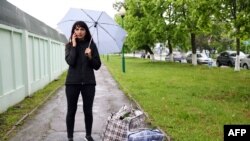The European Union has slammed Belarus for its closure of the country's biggest independent online news publication, Tut.by, as one of its reporters left prison after serving six months for her reporting on the death of a protester killed during a crackdown on demonstrations against authoritarian ruler Alexander Lukashenko.
In a statement on May 19, an EU spokesman called the blocking a day earlier of the popular news site an "act of continued repression and intimidation" against independent media.
Belarusian authorities also raided Tut.by’s offices in Minsk and other regions, and the homes of its journalists and employees, breaking the door leading to the apartment of Maryna Zolatava, the site’s editor in chief. The Minsk-based Vyasna (Spring) human rights group said on May 19 that 12 women and two men who worked for the publication had been detained.
"The harassment of journalists must stop and all those detained must be immediately released, together with all political prisoners," EU spokesman Peter Stano said in the statement.
"The EU continues to stand by the people of Belarus in their call for respect of human rights and fundamental freedoms and will continue to support civil society and independent media," he added.
The EU statement came hours after Katsyaryna Barysevich was released from a penal colony in the southeastern city of Homel on May 19 after serving her sentence for articles she wrote on the death of Roman Bandarenka, who was protesting against Lukashenka's victory claim in an August 9 presidential election that the opposition says was rigged. The articles included medical details that contradicted official statements that Bandarenka was drunk at the time of his death.
Barysevich told journalists after her release that her incarceration "failed to break" her and that she looked at the absurdities of her situation to ease her mind.
"I learned to look calmly at all of the crazy things around me. I cannot say that somebody broke me, or that I entered a jail in November as one person and left it as a different one. To my big surprise, it turned out that I am a very strong person.... There was a moment on the first day [of my arrest] when I wanted to cry but when I saw 19- and 20-year-old students in my cell... I understood that crying is not an option for me," Barysevich said.
"I had a brown card that is given to individuals with the status of 'inclined to extremism,' so I was transported handcuffed along with two women sentenced to nine years and 10 years in prison for murder. They were laughing that they were not handcuffed, while I was!" she said.
The doctor, Artsyom Sarokin, was handed a suspended two-year prison term and ordered to pay a fine of 1,450 rubles ($555) for disclosing the information to Barysevich.
The Committee for the Protection of Journalists condemned the raids on the offices of Tut.by and its affiliates across the country, as well as the homes of the company’s editors. A total of 14 employees from the media group were detained as suspects in an alleged tax evasion case.
"It’s clear that authorities’ only real motive is to censor Belarus’ premier independent news website out of fear of its reporting. Authorities must release all Tut.by employees immediately and without charge, and should allow the outlet to work freely,” Gulnoza Said, the New York-based watchdog's Europe and Central Asia program coordinator, said in a statement.
A co-owner of Tut.by, Yulia Charnyauskaya, also was detained on May 18 but rushed to a Minsk hospital with heart problems, where she spent several hours. Her current whereabouts are unknown, Vyasna says.
A Tut.by co-founder, Kiryl Valoshin, told Current Time on May 18 that there is sizeable support in Belarus for the publication, which has over 3 million online users. But he said he doubted that an escalating crackdown on the media and civil society in the country following protests over a disputed presidential election last August will stop any time soon.
"Unfortunately, let us admit that the level of violence and lawlessness in the country is so high that even the possible closure of Tut.by will not make its supporters do something more than express their thoughts on social networks," Valoshin said, adding that he hopes Tut.by will be able to continue operating in some form.
Belarusian authorities have stepped up their repression of journalists and bloggers ever since the start of mass protests sparked by the presidential election. Tut.by has been under pressure for months.
Outrage over what was seen as a rigged vote to hand Lukashenka a sixth term in office brought tens of thousands onto the streets to protest the outcome.
Security officials have cracked down hard on the demonstrators, arresting thousands, including dozens of journalists who covered the rallies, and pushing most of the top opposition figures out of the country.
Some rights organizations say there is credible evidence of torture being used by security officials against some of those detained.
Lukashenka, who has run the country since 1994, has denied any wrongdoing with regard to the election and refuses to negotiate with the opposition on stepping down and holding new elections.
The European Union, United States, Canada, and other countries have refused to recognize Lukashenka, 66, as the legitimate leader of Belarus and have slapped him and senior Belarusian officials with sanctions in response to the “falsification” of the vote and postelection crackdown.




